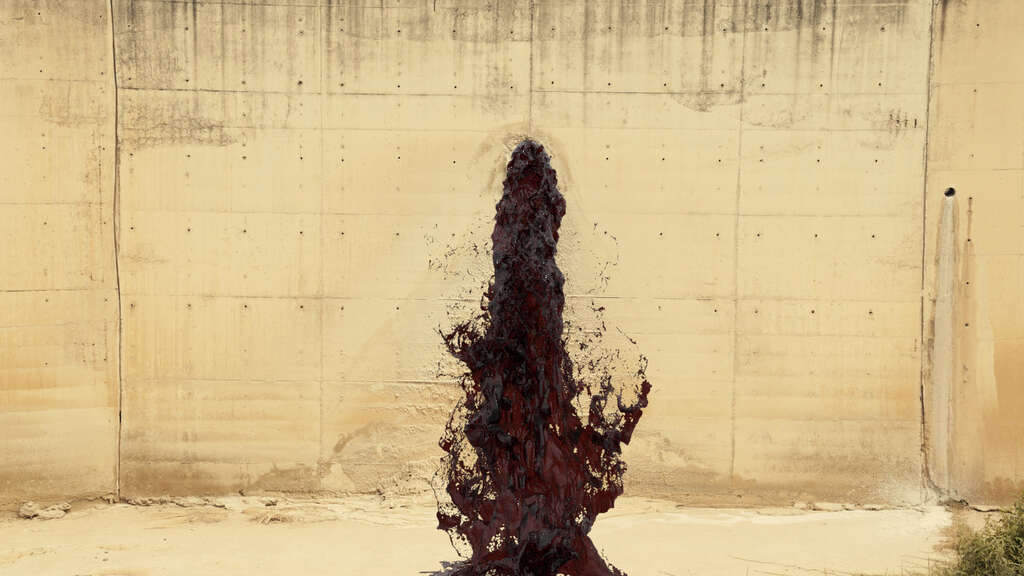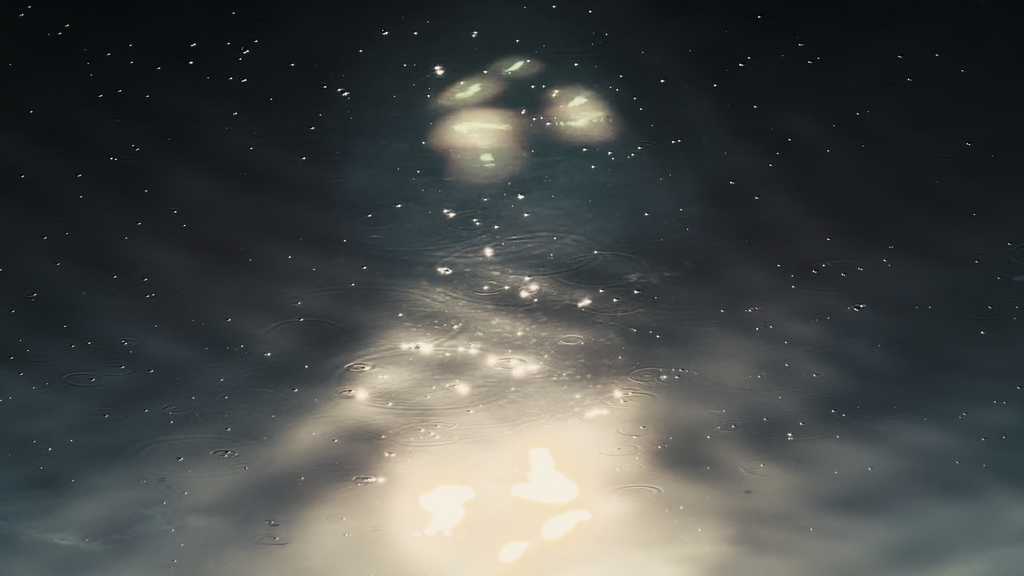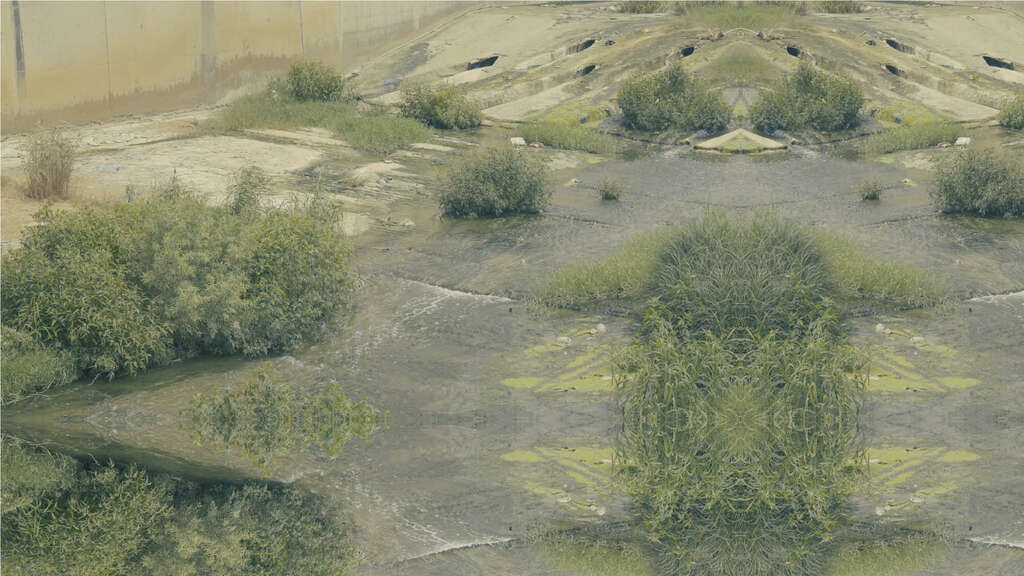Panos Aprahamian: More Spilled Blood Than Drinkable Water (EN)
During opening hours: Tuesday to Sunday, 11:00 to 18:00.
More Spilled Blood Than Drinkable Water (2025), a short film moving between documentary realism and speculative fiction, is set in Beirut’s former quarantine district of Karantina. A disembodied voice leads viewers along the river into an underworld of chemical traces, spectral echoes, and unseen presences in a dystopian landscape of flows and stagnations.
WIELS Auditorium (-1)
The film starts every half hour during opening hours: Tuesday to Sunday, 11:00 to 18:00.
More Spilled Blood Than Drinkable Water (2025), whose title alludes to a line by Palestinian poet and aid worker Jehan Bseiso, is the final instalment of Panos Aprahamian’s unintended, unofficially titled Karantina Trilogy. The film returns to Beirut’s Karantina, a former quarantine district on the city’s northeastern edge, bordered by the heavily polluted Beirut River. Like the preceding works in the triptych, Odorless Blue Flowers Awake Prematurely and This Haunting Memory That Is Not My Own (both 2021), it probes a site marred by environmental degradation, industrial infrastructures, and uncounted deaths.
The district and the river have witnessed recurring cycles of violence, from Armenian refugees fleeing the Ottoman genocide in the 1910s and 1920s, to the political assassinations of 1958, to the Karantina massacre of 1976, when right-wing Maronite militias slaughtered the camp's predominantly Palestinian residents. Layered upon these histories are waste dumps, slaughterhouses, hate crimes, and the devastation of the 2020 Beirut port explosion, also known as the Beirut blast, an event whose causes remain unelucidated. Together, these layers form a sacrifice zone where the city disposes of its dead.
In the film, the eerie, disembodied voice of a paranormal investigator recounts her passage along the river as a descent into the underworld, evoking toxic debris, spectral echoes, foul odours, and unseen presences. The camera lingers on the river’s ebb and flow, revealing deteriorating ecologies and wavering industrial reflections, while the narration – part investigative report, part diary entry, part speculative fiction – threads fractured histories into a non-linear chronicle. Blending documentary realism, abstraction, and fiction, Aprahamian transforms the river into both a portal to the intangible and a distressed mirror of the present, confronting the sediments of violence, trauma, and environmental ruin.
Panos Aprahamian (b. 1986) is a Berlin-based unfiction filmmaker, media artist, and writer from Beirut's peripheral rustbelt. Through language, image, and ritual, his practice explores the spectral presence of the future past in undead bodies, sacrificial landscapes, and social relations. He studied at the Lebanese Academy of Fine Arts and the University of the Arts London, graduating with an MA in Documentary Film in 2015. Aprahamian was a Caspian Arts scholar in 2015 and a fellow at Ashkal Alwan's Home Workspace Program between 2017 and 2018. He is the winner of the Ecumenical Prize at the 2022 Oberhausen Short Film Festival, recipient of the Eliza Moore fellowship for artistic excellence in 2024, and the Han Nefkens Foundation – Museu Tàpies Video Art Production grantee for the 2024–2026 cycle. Between 2019 and 2021, he taught at the American University of Beirut in the Fine Arts Department and the Media Studies Program.
CREDITS
Panos Aprahamian, More Spilled Blood Than Drinkable Water, 2025, 19 min, English spoken.
English subtitles
Research & Script: Panos Aprahamian
Cinematography: Vicken Avakian
Soundscape: Reeda Fneiche
Animation: Elissa Assaf
Editing: Panos Aprahamian
Produced by The Han Nefkens Foundation, Barcelona
In collaboration with Museu Tàpies, Barcelona; Jameel Arts Centre, Dubai; Museum of Contemporary Art and Design (MCAD), Manila; NTU Centre for Contemporary Art Singapore; WIELS, Brussels, and Museo d'Arte Contemporanea Donnaregina (MADRE), Naples
The Han Nefkens Foundation is a private, non-profit organisation set up in Barcelona in 2009 by Dutch writer and patron, Han Nefkens. It focuses solely on the production of video art, with the aim of connecting people through art across the world. The Foundation develops its activities thanks to a large worldwide network of experts who combine their knowledge and experience as scouts, advisors and jury members when selecting the artists who will benefit from its support. Positioned as a platform for emerging to mid-career video artists to advance their careers, its main activity is to commission new works through grants and commissions on an international level that culminate in exhibitions at partner institutions. The Foundation works closely with the artists in a made-to-measure way, according to each artist's needs, from the very first moments up until the final presentation.


